Cite this document
(Postcolonial Native American Children Essay Example | Topics and Well Written Essays - 2000 words, n.d.)
Postcolonial Native American Children Essay Example | Topics and Well Written Essays - 2000 words. https://studentshare.org/history/1834881-postcolonial-native-american-children
Postcolonial Native American Children Essay Example | Topics and Well Written Essays - 2000 words. https://studentshare.org/history/1834881-postcolonial-native-american-children
(Postcolonial Native American Children Essay Example | Topics and Well Written Essays - 2000 Words)
Postcolonial Native American Children Essay Example | Topics and Well Written Essays - 2000 Words. https://studentshare.org/history/1834881-postcolonial-native-american-children.
Postcolonial Native American Children Essay Example | Topics and Well Written Essays - 2000 Words. https://studentshare.org/history/1834881-postcolonial-native-american-children.
“Postcolonial Native American Children Essay Example | Topics and Well Written Essays - 2000 Words”. https://studentshare.org/history/1834881-postcolonial-native-american-children.


